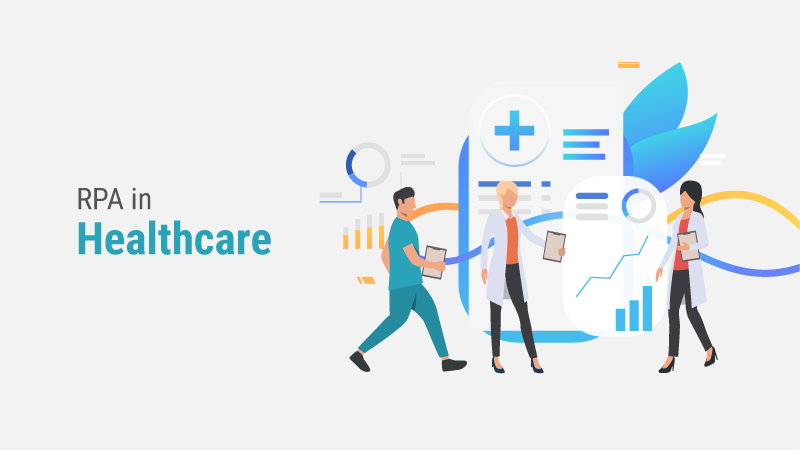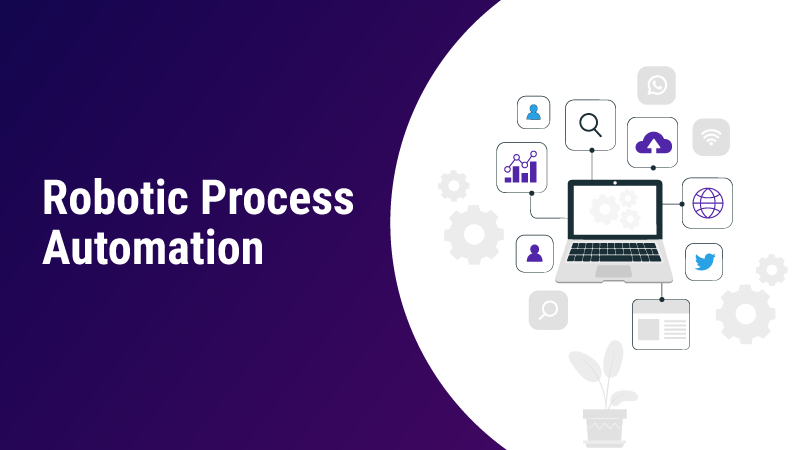RPA in Healthcare Industry: Use Cases and Benefits

The healthcare system includes a bundle of onerous tasks like claim management that demand a notable amount of resource allocation. This results in increased operational costs and slower processes. When it comes to hospital or healthcare industries, the doctor is more involved in data management than addressing the patient especially in the middle of unlimited tasks. To maintain the time and effort spent by health care professionals on patient care rather than focusing on other tasks, automating that process is the only solution.
Robotic Process Automation (RPA) deploys processes including – appointment scheduling, booking prescriptions, and managing claims by sending invoices – automatically on the computer. This allows employees to unburden themselves and relax from the weight of multiple complex tasks. Healthcare professionals will be able to address the issues of the patients by utilizing the power of automation and RPA, thus speeding up health care processes, making the health care systems efficient, and increasing patient satisfaction.
Use Cases of RPA in the Healthcare Industry
We have discussed the importance of Robotic Process Automation in the health sector. Now let’s talk about the applications or use cases of RPA in the healthcare industry.
Scheduling patient appointments
The patients will be able to book their appointments with no involvement of hospital staff, with the incorporation of RPA technology in the health sector. The application also helps to enhance customer relationships as patients can quickly schedule appointments as per their convenience, in addition to minimizing the need for resource allocation in appointments scheduling.
Management of claims
With the quickly emerging demand for health insurance, claims management has turned to a complicated one as it includes various processes such as inputting, processing, assessing data, and managing appeals. It can be proved that it is efficient and error-free if the whole procedure uses manual or standard software. Obsolete insurance claim procedures can affect hospitals’ cash flow. As per the studies conducted in America, medical insurance is one of the most widely seen insurance frauds in the US. Adopting Robotic Process Automation solutions in healthcare services can enhance the efficacy of intricate insurance claim management processes.
Regulatory compliance
Approximately 30-40% of claims to health insurance can be rejected because of non-compliance to regulations. Therefore, another complex task is to provide regulatory compliance for claiming insurance. RPA facilitates healthcare professionals or hospital authorities to monitor and document each process step at every stage of the process in an ordered logbook, thus allowing the company to meet the requirements during external audits. As these processes are managed by RPA bots, it increases the confidentiality of the data.
Ordering drugs and other hospital stationaries
There should be enough drugs stock hospitals, but it has been found that there is a shortage of medicines in many hospitals due to a lack of proper stock management. This problem can be easily solved by deploying RPA technology in the distribution, storage, and inventory of medicines and automatically booking the drugs before the stock runs out.
Enhanced account settlement
hospitals are required to calculate and evaluate bills for each and every patient during their diagnosis and treatment. It will take a considerable amount of time to process such data manually and yet, 100 percent accuracy is not guaranteed. In addition, it is essential to keep a record of numerous checks, prescriptions, doctor’s fees, charges levied on room/bed, and any other fee for calculating each patient’s bill with accuracy. Manually processing this task can be very complicated for hospital staff and enabling RPA bots not only makes this process easier but also maintains the accuracy of bills based on the expense of tests, medicines, etc. Using RPA software in the healthcare industry will minimize the risk of error and therefore, it speeds up account settlements in the healthcare sector.
Benefits of using RPA in healthcare
Now let us move on to the benefits of implementing RPA in health care services.
Reduced cost
The cost a hospital has to incur for implementing RPA bots is very less when compared to the costs for paying the employees to do complex manual tasks. As per the study conducted by CAQH, the healthcare industry could save 13.3 billion dollars if automation is brought to administrative tasks.
Elimination of errors
RPA bots are trained to apply programmed rules. Humans can make mistakes knowingly or unknowingly but when the bots take the place of humans, they cannot make errors. When there are no errors in the code, then the rule-based tasks will be totally free from errors.
Increased appointment turnout
Automation in administrative tasks makes appointment scheduling easier. RPA bots will send reminders to patients about their appointments. Therefore, there are fewer chances of patients missing appointments, so doctors give more care to patients, which directly improves productivity and efficiency.
Better patient experience
RPA bots increase the efficiency of front-office support and make it easier for the patient support team to handle questions or doubts from patients. Customer service from health care providers can be increased to a high level with RPA solutions being in the front and back office.
Improved employee satisfaction
Hiring your workers for monotonous jobs can adversely affect employee satisfaction, which may result in more employee turnover. This will in turn lead to employees remaining less productive even while hiring and onboarding is in progress. Here RPA bots can come to aid as they reduce the workload on employees and automate tasks that are complex and tedious.
Wrap Up
The healthcare industry is one of the most incompetent industries, and minimizing such incompetence in the health sector can result in providing quality healthcare that is essential to both industry and public. RPA (Robotic Process Automation) is easy and facilitates fast deployment of solutions that have allowed the healthcare industry to enhance each and every process and procedure from patient registration to claim management. Human activities are time-consuming and error-filled, but defined work processes can be emulated easily with RPA. Using RPA-enabled automation and quick execution plans, health care providers can eliminate expensive and long-term digital conversion plans and obtain quick rewards.
Get Started with our RPA ServicesRead more about RPA
Blogs by Category
AppForms Artificial Intelligence Blockchain Call Centers Chatbots Cloud Computing Data Management Design Digital Marketing Digital Transformation Enterprise Applications FinTech Insights LowCode Development Microsoft Mobile Apps News Office 365 Robotic Process Automation Security SharePoint Software Development Web ApplicationWhat is Robotic Process Automation? RPA Explained

2024-05-23 16:56:57